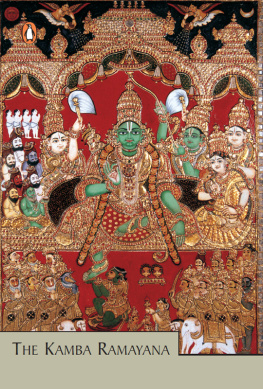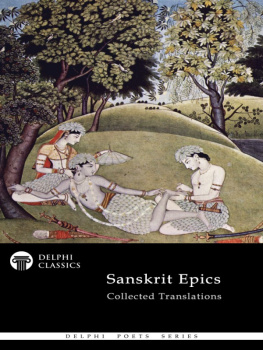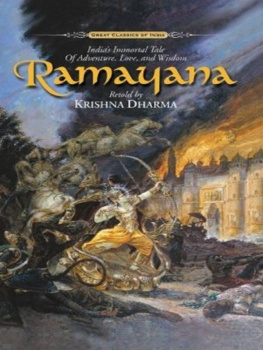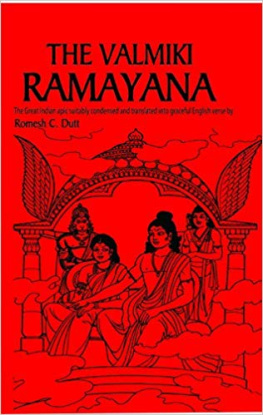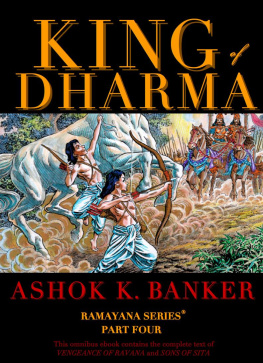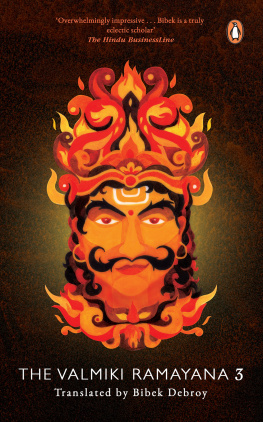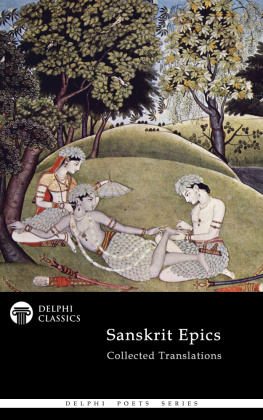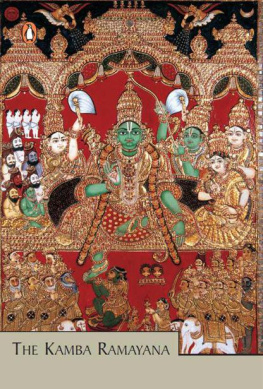Penguin Books is part of the Penguin Random House group of companies whose addresses can be found at global.penguinrandomhouse.com.
This digital edition published in 2016.
This book is sold subject to the condition that it shall not, by way of trade or otherwise, be lent, resold, hired out, or otherwise circulated without the publishers prior consent in any form of binding or cover other than that in which it is published and without a similar condition including this condition being imposed on the subsequent purchaser.
P.S. Sundaram, who took his Masters degree in English Language and Literature from Madras University (1930) and, later, from Oxford (1934), had a long and distinguished career as a professor of English at Lahore, Cuttack, Bareilly and Jaipur. For a short stint in between, he was Member, Public Service Commission, Orissa. He is the author of two books on R.K. Narayan and has translated an impressive array of Tamil classics into English. In addition to the present work, he has translated into English selected poems of Subramania Bharati, Tiruvalluvars Kural, Andals Thriuppavai and Nachchiyar Thriumozhi.
N.S. Jagannathan holds a First Class Masters degree in English Language and Literature from Madras University. After a few years of college teaching and a stint in the Civil Service, he became a full-time journalist, working successively in senior positions in the Hindustan Times, the Statesman, the Financial Express and the Indian Express. He retired as Chief Editor, the Indian Express, in 1991.
Preface
My acquaintance with Professor P.S. Sundaram (19101998) began decades ago when, just out of the university, I appeared before the Orissa Public Service Commission for a job in the English department of the Ravenshaw College, Cuttack. As Professor of English in that college, he was the expert among members on the Selection Board. He put me through the wringer with a certain detached cruelty, dictated no doubt by his anxiety to ensure that his future colleague was not a dud. I got the job and thus began a life-long friendship that has been one of the great blessings of my life.
Ravenshaw College was founded in the nineteenth century and is one of the oldest and among the highly regarded Indian educational institutions. Being the only government college in Orissa at that time, it has been the alma mater of innumerable distinguished sons of Orissa and has had some of the finest teachers of the country. In my time, besides Sundaram, there was in the English department the genial V.V. John, an irrepressible wit who hid a profoundly serious mind behind an apparent air of levity and high spirits.
My own stay in Orissa was a brief one, lasting less than sixteen months. But during this short period, both John and Sundaram exercised a profound influence on me, not only in the shaping of my literary tastes but also in instilling in me the ineffable values of a civilized, intellectual freemasonry. They were much older than me and I, had I lived in Cuttack instead of Madras during my college years, would have been their student. But in their attitude towards me, there was no trace of condescension or hierarchical snobbery so familiar in Indian academia. In the best traditions of Oxford where both were educated, they treated me, a callow youth though I was, as an equal. To my utter consternation, Sundaram made me teach postgraduate classes in Elizabethan literature of which I, then had only the haziest notions. I had to bone up on much dull and wearying stuff trying to live up to his, if not to my students, expectations.
In the years following, when my own wayward career did not permit me to be in daily contact with Sundaram, we were in regular touch, writing to each other and meeting from time to time. Such meetings were more frequent in his later years when he moved to Madras and always stimulating, our discussions ranging over a wide area. For example, Sundaram was fiercely Anglophile, the consequence of the stereotypes implanted in his mind by his deep love of English literature and the example of some of the great Englishmen that taught him in India and at Oxford. On the other hand, though I shared with him a love for English literature, I was bred on a different perception of the benefits of the Raj. This was one of the perennial themes of our heated exchanges, conducted on his side with exemplary urbanity and generosity to a much younger man.
Sundarams academic credentials were of the highest. A brilliant student of Presidency College, Madras, he got a first class Masters degree in English literature in 1930. As was the almost settled routine of gifted students of the times with a Tamil Brahmin middle-class background, he went to England to join Oxford and, simultaneously, sit for the ICS examination. He tried twice to get into the ICS but on both occasions narrowly missed being chosen to the service, standing fourth or fifth in the ranking. (Unlike in post-Independence India, when selections for the services by competitive examination were a case of mass recruitment in hundreds, those were parsimonious times, with hardly more than five or six being chosen.) So, Sundaram returned to India in 1934 with a degree in English literature from Oxford and launched on a distinguished career as an academician in DAV College, Lahore, in 1934. He joined the Ravenshaw College, Cuttack, as professor in 1938 when he was barely twenty-eight, perhaps the youngest head of the English department at that time.
Unlike John and I, Sundaram stayed on in Orissa for over twenty years, giving the best years of his life to the state, as professor, principal and, from 1953, a Member of the Orissa Public Service Commission. By one of those quirky Constitutional provisions, when his term with the service commission ended in 1959, he could not go back to the government in any capacity. Then in his mid-forties, Sundaram was obliged to seek non-government employment elsewhere. He left Orissa to become Principal of the Bareilly College, and still later, of the Maharanis College, Jaipur, from where he retired in 1974.
It was only then that he could return to his first loveclassical Tamil literature, which he had perforce put on the back-burner because of his teaching and administrative duties. A lifelong engagement with English literature had given him a profound understanding of all aspects of literary imagination. This enabled him to bring to the study of Tamil literary classics a mind uncluttered by the hang-up of traditional Tamil scholarship. As a result, he was able to apply to these works the categories of a wider and universal aesthetics and poetics.
His total command of both the Tamil and English idiom enabled him to embark on a translation enterprise, that, in the retrospect of his actual accomplishment, seems formidable, almost, rash, in its ambition. Obviously, it is a case of one thing leading to another, rather than a premeditated project. Starting with the modern poet, Subramania Bharati, Sundaram took on, successively, Tirukural of Tiruvalluvar and then the mystical poems of Andal and other Aazhwars in the Vaishnavite Bhakti tradition (the last two have been published by Penguin). The last years of his life were taken up with the translation into English verse of the whole corpus of some 12,000-odd verses of the renowned Tamil classic Kamba Ramayana. In itself an awesome feat, considering the hazards of the enterprise, it was, to use the language of the Ramayana, the crest-jewel of his brilliant career in translation.

